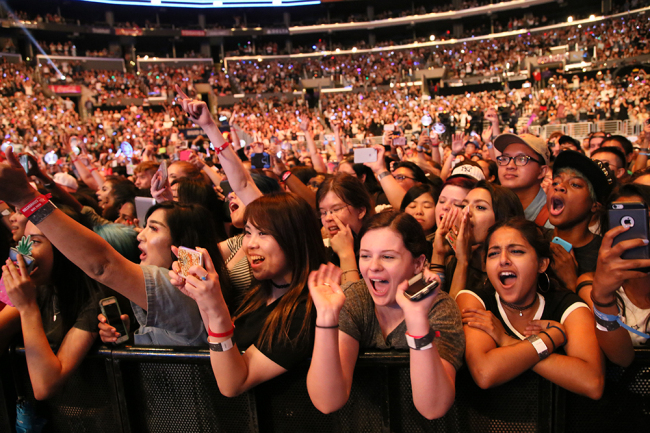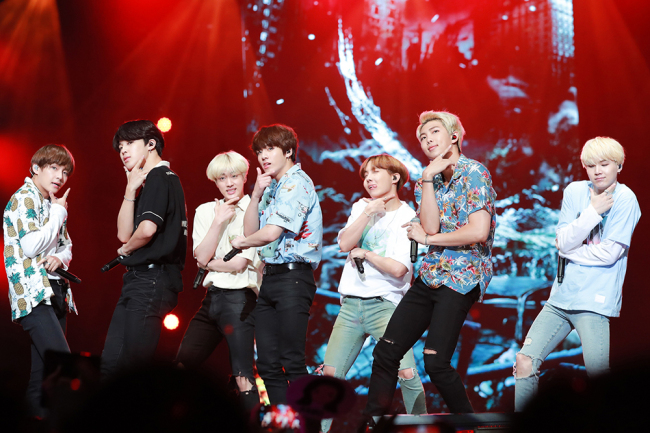« The Korea Herald : Bubble Not To Pop Anytime Soon - Experts see K-pop going on strong for the next decade »
 Tuesday, August 15, 2017 at 3:35AM |
Tuesday, August 15, 2017 at 3:35AM |  DFSB Kollective
DFSB Kollective 
 KCONHas K-pop reached its peak? Or will it be able to keep climbing the ladder of global success?
KCONHas K-pop reached its peak? Or will it be able to keep climbing the ladder of global success?
More than 20 years have passed since the first generation of K-pop boy groups H.O.T and Sechs Kies made waves within the Korean music scene in the ‘90s.
In 2000, legendary dance music duo Clon went overseas and mesmerized fans in Taiwan, which heralded K-pop’s overseas popularity.
Since then, the K-pop industry has never slowed down in rolling out K-pop acts that appeal to a global audience, ranging from Girls’ Generation, KARA, Wonder Girls, Big Bang, 2NE1, and most recently, Gangnam Style star Psy and Billboard award winner BTS.  H.O.T [SM Entertainment]While it might not be the pace of the fast and the furious, K-pop experts say there is no doubt that K-pop is still enjoying its prime, and that it will continue to move forward in the next decade.
H.O.T [SM Entertainment]While it might not be the pace of the fast and the furious, K-pop experts say there is no doubt that K-pop is still enjoying its prime, and that it will continue to move forward in the next decade.
“Think about it, it’s been 17 years since K-pop first came to global attention. That’s a time long enough to prove that K-pop is not just a temporary phenomenon, but a music genre that has ‘absolute’ power and attractions,” said a music critic Lim Jin-mo during a recent talk with The Korea Herald.
“K-pop has overcome its root as Asian music, which says that there’s definitely something about it. I think those attractions are the acts’ impressive group dance performances, singers’ polished looks and chic vibes, their outstanding vocals, and lastly, production ability of their agencies. While 2PM is not as active in Korea as before, it’s still going strong in other Asian countries,” he added.
Bernie Cho, president of DFSB Kollective, a Korean music artist and label services agency, also said that K-pop is not just Korean pop music to many music fans in Asia.
“K-pop is now accepted as ‘pop‘ music that is as popular as or even more popular than Western ’pop‘ music,” Cho said, adding that considering such momentum, K-pop is likely to mature and become more globalized in the next 10 years.  KCONSHORTCOMINGS
KCONSHORTCOMINGS
World star Psy’s 2012 breakout hit, which rose to No. 2 on the Billboard 100, and the unabating global fever for BTS may bode well for future K-pop artists. Despite its unprecedented rise, however, the current state of K-pop can’t be free from concerns about a lack of diversity. While many quote in unison the declining musical diversity as one of K-pop’s longtime problems, Im said it was not an open and shut issue.
“It would be great if K-pop could escape from excessive dependence on teen idol dance music and incorporate diverse genres ranging from folk, rock and even to Korean traditional music. But do you really think international fans would listen to them? This is a complicated matter,” Im said.
Unless the K-pop industry sees another breakthrough even more influential than Psy and BTS over the next decade, Im claimed that it could be hard for the industry to sustain the international spotlight.
“The K-pop industry can’t rehash Psy forever. In the end, people will get bored with similar tunes of idols such as B1A4 and BTS. That’s the reason why the K-pop scene should give birth to another hit star that can propel the industry to the next level,” Im said.
Addressing the concern that the K-pop genre needs to be refined in a way that can accentuate the dynamic diversity of Korea’s different music genres as well, Cho said the Korean music chart system is partially responsible for K-pop’s lack of diversity,
“With all of the major Korean music charts funneling most types of Korean music into just one, single ‘K-pop’ chart, it is impossible for Korean music acts of different genres to be fairly recognized, ranked, and respected in their own respective genre charts,” Cho said.
Although teen idol dance music has been one of the most popular genres in Korea, urban music -- namely hip-hop and R&B -- has been becoming a more popular genre on the top 100 K-Pop singles charts, shows data released from Gaon Music Chart last year.
“It’s like asking a figure skater, speed skater, and ice hockey player to all compete on the same rink for the same gold medal in the same Olympic event,” he added.  CJ E&MPROSPECTS FOR K-POP IN 2030
CJ E&MPROSPECTS FOR K-POP IN 2030
Is K-pop‘s future grim?
Im projected that globetrotting K-pop acts will expand their ground from the US, K-pop’s main overseas market, to China and its neighboring countries in the near future as K-pop continues to go more global.
“S.M., for example, has been fixing their eyes on Asian countries. That’s the reason why they initially created TVXQ in 2003, which translated into ‘Rising Gods of the East’ in Korean. In the same context, S.M. had divided EXO to two sub groups -- EXO K and EXO M -- to target Korean and Chinese fans, respectively,” Im said.
Although K-pop acts haven’t been able to perform in China as actively as before since Korea-China relations soured last year over the deployment of the US THAAD missile system in Korea, Im believed the diplomatic spat between the two countries won’t last forever.
In order to tackle the lingering problem of limited definition of K-pop, Korea Creative Content Agency has been launching overseas musical events such as “K-pop Night Out” at SXSW that aim to help Korean musicians enter overseas markets.
“We are making efforts to financially support and make room for musicians from various genres to gain a foothold overseas,” said Ji Kyeong-hwa from KOCCA’s Music & Fashion Industry Team.
“It is true that foreigners perceive K-pop as Korean idol music, but we hope K-pop doesn’t get limited to such a narrow definition. I think more and more non-idol Korean artists will earn recognition by foreign fans in the next 10 years through such projects to promote various types of Korean music.”
http://www.koreaherald.com
By Hong Dam-young
Featured Commentator : Bernie Cho [DFSB Kollective]
